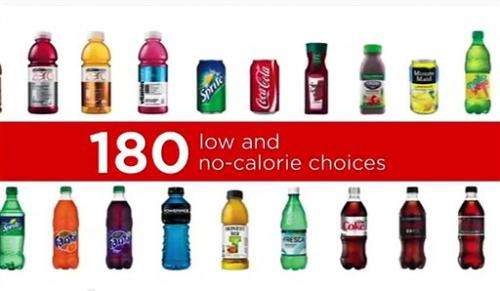Coca-Cola to address obesity for first time in ads (Update)

Coca-Cola became one of the world's most powerful brands by equating its soft drinks with happiness. Now, for the first time, it's addressing a growing cloud over the industry: obesity.
The U.S.-based company on Monday will begin airing a two-minute ad during the highest-rated shows on CNN, Fox News and MSNBC in hopes of becoming a stronger voice in the debate over sodas and their impact on public health. The ad lays out Coca-Cola's record of providing drinks with fewer calories over the years and notes that weight gain is the result of consuming too many calories of any kind—not just soda.
Coca-Cola says the campaign will kick off a variety of moves that help address obesity in the year ahead, such as providing more diet options at soda fountains.
For the world's No. 1 beverage company, the ads reflect the mounting pressures on the broader industry. Later this year, New York City is set to put into effect a first-in-the-nation cap on the size of soft drinks sold at restaurants, movie theaters, sports arenas and other venues.
And when PepsiCo Inc., the No. 2 soda maker, recently signed a wide-ranging endorsement deal with pop singer Beyonce, critics called for the singer to drop the contract or donate the funds to groups that fund health initiatives.
Diana Garza Ciarlante, a spokeswoman for Coca-Cola Co., said the new ads aren't a reaction to any negative public sentiment but that the company felt it needed to address "the issue of the times."
Recent studies have suggested that sugary drinks cause people to gain weight, independent of other unhealthy behavior. A decades-long study involving more than 33,000 Americans suggested that drinking sugary beverages interacts with genes that affect weight, amplifying a person's risk of obesity beyond what they would be from heredity alone.
Mike Jacobson, executive director for the Center for Science in the Public Interest, was skeptical about the intent behind Coca-Cola's ads and said that if the company was serious about helping reduce obesity, it would stop fighting soda taxes.
"It looks like a page out of damage control 101," he said. "They're trying to disarm the public."
In the Coca-Cola ad, a narrator notes that obesity is an issue that "concerns all of us" but that people can make a difference when they "come together."
Another ad, which will run later this week during "American Idol" and before the Super Bowl football championship, is much more reminiscent of catchy, upbeat advertising people have come to expect from Coca-Cola. It features a montage of activities that add up to burning off the "140 happy calories" in a can of Coke: walking a dog, dancing, laughing with friends and doing a victory dance after bowling a strike.
Garza Ciarlante said the 30-second ad, a version of which ran in Brazil last month, is intended to address confusion about the number of calories in soda. She said the company's consumer research showed people thought there were as many as 900 calories in one can.
Coca-Cola notes it has already made several moves to help customers make smarter choices, such as putting calorie counts on the front of its cans and bottles in the U.S. Last year, it also started posting calorie information on its vending machines ahead of a regulation that will require soda companies to do so by 2014.
Public concern over calories counts is apparent in Coca-Cola's business. In North America, all the growth in its soda business over the past 15 years has come from low- and no-calorie drinks, such as Coke Zero. Diet sodas now account for nearly a third of its sales in the U.S. and Canada. Other beverages, such as sports drinks and bottled water, are also fueling growth.
Even with the growing popularity of diet sodas, however, overall soda consumption in the U.S. has declined steadily since 1998, according to the industry tracker Beverage Digest.
Copyright 2013 The Associated Press. All rights reserved. This material may not be published, broadcast, rewritten or redistributed.
















